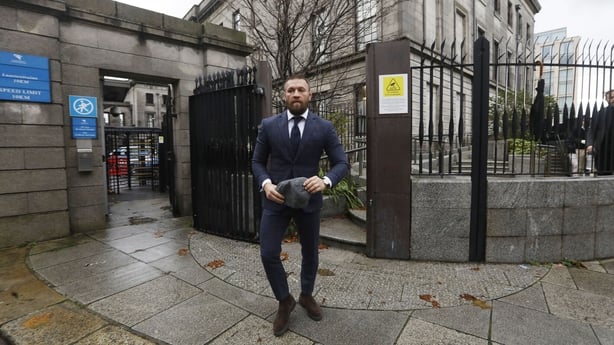The judge in the civil case against mixed martial arts fighter Conor McGregor has told the jury that their role is as judges of fact and that they must look "wholly, rationally and calmly at the evidence".
Nikita Hand, 35, is suing Mr McGregor and his friend James Lawrence in the High Court, alleging she was raped by them in a Dublin hotel in December 2018.
In his charge to the jury, Mr Justice Alex Owens said everybody who comes into the court is equal in accordance with law and deserves to be treated with respect and cannot be viewed with any prejudice.
Their inquiry is evidence based, he said.

Judge Owens said they were being asked to decide if Mr McGregor assaulted Ms Hand and equally if Mr Lawrence assaulted Ms Hand.
He said Ms Hand is claiming damages for the tort of assault and explained that a tort is a civil wrong and a claimant who proves they were assaulted by a defendant is entitled to damages if it is proved.
He said Ms Hand had the obligation to prove the allegation as she has brought the action and the jury must decide whether the evidence presented establishes the objective truth.
"What matters is your overall conclusion," he said.
"In order to bring in a verdict in favour of Ms Hand you must be satisfied that she proved her case against that defendant," he said.
Read more: Woman 'marked' for 'standing up to McGregor', court told
Judge Owens said the jury must answer: "Does the evidence prove she was assaulted by Mr McGregor in the penthouse of the Beacon?
"Does the evidence prove she was assaulted by Mr Lawrence?
"Those are the beginning middle and end of the case and everything rotates around those two questions.
"She alleges she was raped, they say no and say it was consensual. This is two separate legal actions heard together for administrative convenience."
He said the jury must decide if is Ms Hand's account that she was raped by Mr McGregor is more likely than not to represent the objective truth and says he uses that word rather than truth or lies. If not you proceed no further," he said.
The first question on the issue paper presents the simple answer of yes or no, he said, adding that proof is on the balance of probabilities in a civil action.
He added that "something is proved on the balance of probabilities when you decide on the evidence it is more likely to have happened than not".

The judge told the jury members they were entitled to decide if they believe or do not believe a witness.
He explained to the jury that there are only two versions of events and they are not entitled to speculate on a possible third version, adding: "Work on what you have and not on what you don't have such as what a witness who was not called might have said.
"Pay no attention to that despite both counsel referring to it. Your job is to decide the case in accordance with the evidence."
He said it really boils down to who you believe. "It is a matter of truth or lies. One side or the other in this case is telling lies, that is my view for what it is worth," he said.
Judge Owens said the jury may also consider did she have sex with Mr Lawrence.
"Did they have sex and if so what does that tell you?"
He said one side or the other is lying.
Would it be improbable that a person who has just confided in someone that they had been raped then go on to have sex twice with someone.
"You can analyse a witness and accept parts or reject parts of their evidence," he said.
Judge Owens said the case against Mr Lawrence is the same - was she assaulted by him?
He said: "If evidence doesn't get you there on the balance of probabilities then the answer must be no.
"She invites you to conclude she was too drunk to consent and you are asked to infer that he knew she was not fit to consent and that the bruising would have been visible on her at that stage.
Does the evidence support that inference? "
We need your consent to load this rte-player contentWe use rte-player to manage extra content that can set cookies on your device and collect data about your activity. Please review their details and accept them to load the content.Manage Preferences
He said the trials against Mr McGregor and Mr Lawrence are separate and it does not follow that they need to reach the same conclusion on each question against each man.
"You answer them separately even though the evidence is common to both," he said.
Damages must also be assessed separately as some issues regarding her damages relate only to her claim against Mr McGregor, for example the PTSD.
The judge said Ms Hand has no memory of sex with Mr Lawrence and her personal belief is that she did not have sex with him and it was made up to damage her character, so there is no basis to award damages for PTSD against Mr Lawrence.
"So you are not being asked to award special damages against Lawrence," he explained.
Returning to the issue of tort, he said most torts in law arise out of negligence cases.
An assault is also a tort, an assault is a non-consensual intentional contact with a person.
Judge Owens said consensual sexual activity is where both sides are in free and voluntary engagement.
"Submission is not consent - it is not necessary to prove a person resisted, tried to run away or raise the alarm," he said, adding that a person can freeze.
As to drunkenness - he said he would say a lot about this.
McGregor case updates as they happened
"John Jameson and Arthur Guinness and the makers of bacardi are co conspirators in this," he said.
The judge said people may have consensual sex while intoxicated, but it is different when someone is so intoxicated they cannot exercise free and voluntary will, and may simply be so out of it they have no clear idea as to what they are about.
However, drunken consent can still be consent, he said, adding that the jury would have to examine all the evidence in relation to all of this including the CCTV footage of Mr Lawrence and Ms Hand.
The judge also told the jury: "You should be cautious about what you think about what someone who is a victim of sexual assault should have done, it does not follow they will complain to the person about what happened , they may respond to that event in ways that may seem irrational. That is just my observation."
Judge Owens said wearing certain clothes on Instagram is not an invitation.
He said: "Of course men might be attracted to woman but if they want to take it further it requires consent.
"The fact that a woman engages in risky activity like drinking or taking drugs does not mean they are up for sex.
"While excessive alcohol can lead to disinhibition you cannot engage in a presumption that the women who engage in this behaviour are promiscuous.
"You look for sound evidential basis and not lazy assumptions or victim blaming."
He sid the jury could conclude that excessive alcohol affects good judgement and affects memory and that it can lead to patchy and fragmented memory of the night before - these are all matters you have experience of and do not require medical expertise, the judge said.
The case continues tomorrow.







